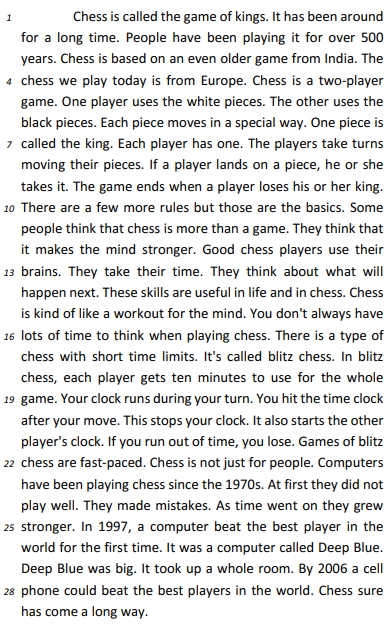Questões de Concurso
Sobre pronomes | pronouns em inglês
Foram encontradas 709 questões
On the basis of this definition, it is correct to say that the words “almost” (last sentence of the second paragraph), “favor” (third sentence of the fourth paragraph), “which” (first sentence of the last paragraph) and “between” (third sentence of the last paragraph), which were taken from text 4A1-II, are, respectively,
( ) The underlined word in “… it helps to know more about hot air balloons themselves.“ is a relative pronoun.
( ) The preposition in the following sentence “…keeping the balloon floating above the ground.” means that the balloon is floating over the ground.
( ) The words ‘actually’, ‘push’, and ‘major’ mean in Portuguese: ‘atualmente’, puxar’ and ‘maior’.
( ) The negative form of “A hot air balloon has three major parts: the basket, the burner, and the envelope.” is “A hot balloon doesn’t have three major parts: the basket, the burner, and the envelope.”
( ) The tense used in the question “Have you ever wondered what keeps a hot air balloon flying?”, is an example of Past Perfect.
Choose the alternative which presents the correct sequence, from top to bottom.

Internet: <www.nortechplus.com>.
Read text I and answer the question that follow it.
Text I
The New Rules of Data Privacy
The data harvested from our personal devices, along with our trail of electronic transactions and data from other sources, now provides the foundation for some of the world’s largest companies. […] For the past two decades, the commercial use of personal data has grown in wild-west fashion. But now, because of consumer mistrust, government actions, and competition for customers, those days are quickly coming to an end.
For most of its existence, the data economy was structured around a “digital curtain” designed to obscure the industry’s practices from lawmakers and the public. Data was considered company property and a proprietary secret, even though the data originated from customers’ private behavior. That curtain has since been lifted and a convergence of consumer, government, and market forces are now giving users more control over the data they generate. Instead of serving as a resource that can be freely harvested, countries in every region of the world have begun to treat personal data as an asset owned by individuals and held in trust by firms.
This will be a far better organizing principle for the data economy. Giving individuals more control has the potential to curtail the sector’s worst excesses while generating a new wave of customer-driven innovation, as customers begin to express what sort of personalization and opportunity they want their data to enable. And while Adtech firms in particular will be hardest hit, any firm with substantial troves of customer data will have to make sweeping changes to its practices, particularly large firms such as financial institutions, healthcare firms, utilities, and major manufacturers and retailers.
Leading firms are already adapting to the new reality as it unfolds. The key to this transition — based upon our research on data and trust, and our experience working on this issue with a wide variety of firms— is for companies to reorganize their data operations around the new fundamental rules of consent, insight, and flow.
[…]
Federal lawmakers are moving to curtail the power of big tech. Meanwhile, in 2021 state legislatures proposed or passed at least 27 online privacy bills regulating data markets and protecting personal digital rights. Lawmakers from California to China are implementing legislation that mirrors Europe’s GDPR, while the EU itself has turned its attention to regulating the use of AI. Where once companies were always ahead of regulators, now they struggle to keep up with compliance requirements across multiple jurisdictions.
Adapted from: https://hbr.org/2022/02/the-new-rules-of-data-privacy
February 25, 2022 – Retrieved September 6, 2022

A reflexive pronoun refers back to the subject of a sentence or clause; there is an example of a reflexive pronoun in the third paragraph.

The term “Whatever” (line 9) functions as a pronoun.

In the second paragraph, the words “How”, “Why” and “When” function as question words and that is their main and only use in the English language.

The relative pronoun “that” (line 2) could be correctly replaced by which, without a change in meaning.

The term “who” (line 8) is a relative pronoun, as well as whom, which is the object form of who.
Choose the correct sequence to complete the following paragraph.
Aldous Huxley, _____ I met only once, is arriving tomorrow. His most famous book, _____ contains interesting ideas, is called Brave New World. Mr. Huxley warns us against the consequences of technology, ______ may destroy us if we do not take the necessary precautions.
Text for the item.

According to the text, judge the item.
The term “their” (line 18) is an example of subject pronoun.
Text for the item.

Internet: <www.ducksters.com> (adapted).
According to the text, judge the item.
In the sentence “The Taliban were strict Muslims who
demanded that all people follow Islamic Sharia
law.” (line 11), “who” is a relative pronoun and can be
substituted by that or which.
Text for the item.

Internet: <www.ducksters.com> (adapted).
According to the text, judge the item.
In the sentence “He asked ‘Who is Malala?’ and said he
would kill them all if they didn't tell him.” (line 28), “He”
and “they” are examples of subject pronouns and work
as the subject of the verb, while “them” and “him” are
object pronouns.
According to the text, judge the item
The relative pronoun “who” (line 5) can be correctly replaced with that.
Regarding the vocabulary of the text, decide whether the statements below are right (C) or wrong (E).
In line 14, the word “both” is used as a pronoun for the
antecedent “double business bound” (line 12).
“In Japan, they call them ‘manga’; in Latin America, ‘histotietas’; in Italy, ‘fumetti’; in Brazil, ‘história em quadrinhos’; and in the U.S., ‘comics’.”; ” All of Mexico’s comic titles together.
The words in bold are respectively:
Manga account_______. nearly fifty percent of all the books and magazines published in Japan each year. And few magazines of any kind in the world can match this number: Shonen Jump, the leading comic title, has a circulation of 6.5 million copies week!
“Ever since comics first appeared, there have been(1) people who(2) have criticized(3) them(4).”
Pay attention to the underlined words and decide if they are true ( T ) or false ( F ).
( ) the word who(2) is a relative pronoun.
( ) there have been(1) is the present perfect tense of there to be.
( ) the word them(4) is an example of personal pronoun.
( ) the underlined words have criticized(3) is being used in the simple past tense.
Choose the alternative which presents the correct sequence, from top to bottom.
Consider on the text, judge the item.
The relative pronoun “which” (line 6 and line 14) can be
substituted by that. The same way that “that” (line 16)
can be substituted by which.
Consider on the text, judge the item.
In the sentence “what lies above and below it, what is
permanently attached to it” (lines 9 and 10) both
occurrences of the pronoun “it” are related to the same
noun.


